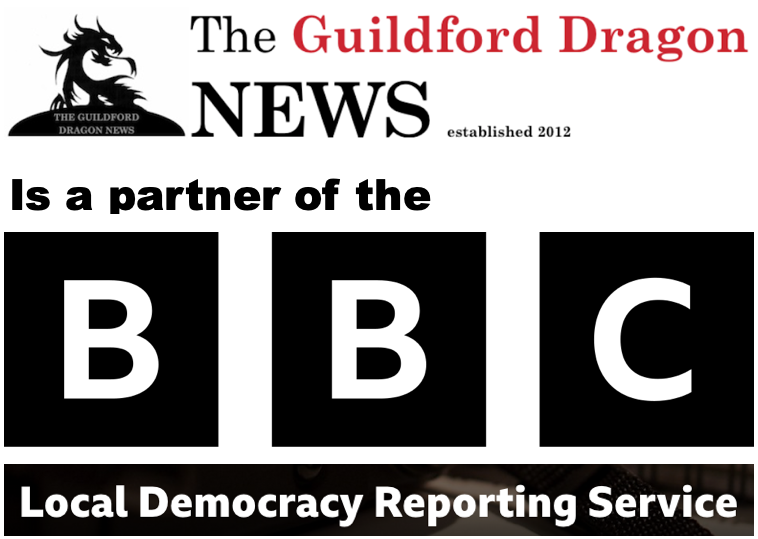 Abraham Lincoln
If given the truth, the people can be depended upon to meet any national crisis...
Abraham Lincoln
If given the truth, the people can be depended upon to meet any national crisis...
 Guildford news...
for Guildford people, brought to you by Guildford reporters - Guildford's own news service
Guildford news...
for Guildford people, brought to you by Guildford reporters - Guildford's own news service
The Dragon Says: Questions Remain Over the Eashing Solar Farm Affair
Published on: 19 Oct, 2015
Updated on: 22 Oct, 2015
 Reports of money being offered to a political party, payable when planning permission is granted, quite properly, rings alarm bells.
Reports of money being offered to a political party, payable when planning permission is granted, quite properly, rings alarm bells.
Then when the party concerned knows nothing about the offer there are more questions to ask.
Superficially, this could be put down to the naivety of those making the application and the offer. They claimed they had done their homework and were offering compensatory payments in line with current government guidelines.
Additionally, the offers were made quite openly in letters and emails. However misguided there was no apparent subterfuge. Bizarre perhaps, but hardly sinister.
And it is true that compensatory payments do form part of many planning applications. In themselves they are no bad thing. If a town, a village or an area has to put up with an installation, or loss of amenity, why shouldn’t they be compensated with funding to make improvements elsewhere?
But normally such payments are negotiated with planning officers in the pre-planning stage of an application, not made direct to a parish council and certainly not offered to a political party nor without their knowledge.
Is it possible that Solar Power South Ltd, the company wishing to install a solar farm in Eashing or Savills estate agents who were helping with the planning application, were not aware that the Guildford Greenbelt Group was a political party? Its name does not make it obvious but a simple Google search would have revealed the truth. In any case, they are reported to have told a council official that they were aware of GGG’s status. Curious.
The whole tale is curious. Cllr Liz Hogger (Lib Dem, Effingham) said she had never heard of anything like it in her 16 years as a councillor. Hardly surprising.
But there are three remaining questions:
Why didn’t Solar Power South and Savills check with GGG that they would accept or even wanted the £125,000? They did not communicate with the party until October 6th, more than a week after they were named as potential recipients. Even on October 6, because Savills used a generic address, the email to GGG was automatically directed to a spam folder and discovered only when checks were made.
Why didn’t Cllr Tony Rooth (Con, Pilgrims), a retired solicitor and a lead councillor, or the planning officer Paul Sherman, alert Satish Mistry, the monitoring officer at GBC, responsible for ensuring business is conducted properly at the council, when they were informed by email on September 28? Surely any mention of payments being offered to a political party should have triggered an alert?
And finally, who tipped off the Surrey Advertiser on or before October 6 when they first contacted Susan Parker and, most importantly, why? Was it an attempt to blacken the name of the GGG, as their leader seems to believe? If so it was reprehensible.
Until we have answers to these questions suspicion will remain about this apparently bizarre affair.
See also: Letter – Offer of Community Benefit Package Followed Government Guidance
Responses to The Dragon Says: Questions Remain Over the Eashing Solar Farm Affair
Leave a Comment Cancel reply
Please see our comments policy. All comments are moderated and may take time to appear. Full names, or at least initial and surname, must be given.
Click on cartoon for Dragon story: Public Asked for Views on SCC’s Proposal for Reduced Speed Limits




Recent Articles
- Notice: Free Bereavement Support Programme
- Normandy Housing Plan Reignites Concerns Over ‘Damage To Our Community’
- Letter: The Class of 1955 Meets 70 Years On.
- Highways Bulletin: Reimagining Parking with Green Design
- Opinion: Never Have We Needed the Benefits of the Natural World More
- SCC Calls on the Government To Protect the Environment
- Two-Week Road Closure on Portsmouth Road for Gas Network Upgrade
- Charlotteville Cycling Club Organises Another Successful Race Event
- Waverley Council To Bring Green Space Maintenance In-house
- A New Dementia Centre for Guildford



Recent Comments
- Richard Cooke on Letter: Snail-paced Progress for Full Weir Repair
- Bethan Moore on Guildford’s First “Bike Bus”
- Andy Friend-Smith on Guildford’s First “Bike Bus”
- Peter Mills on Guildford’s First “Bike Bus”
- Des Flanders on Making History As Pewley School’s Class of ’54 Hold Their Final Reunion
- Margaret Rotherham on Guildford Festival Burst with Colour, Culture and Community Spirit
Search in Site
Media Gallery
Dragon Interview: Local Artist Leaves Her Mark At One of England’s Most Historic Buildings
January 21, 2023 / No Comment / Read MoreDragon Interview: Lib Dem Planning Chair: ‘Current Policy Doesn’t Work for Local People’
January 19, 2023 / No Comment / Read MoreA3 Tunnel in Guildford ‘Necessary’ for New Homes, Says Guildford’s MP
January 10, 2023 / No Comment / Read More‘Madness’ for London Road Scheme to Go Ahead Against ‘Huge Opposition’, Says SCC Leader
January 6, 2023 / No Comment / Read MoreCouncillor’s Son Starts Campaign for More Consultation on North Street Plan
December 30, 2022 / No Comment / Read MoreCounty Council Climbs Down Over London Road Works – Further ‘Engagement’ Period Announced
December 14, 2022 / No Comment / Read MoreDragon Interview: GBC Reaction to the Government’s Expected Decision to Relax Housing Targets
December 7, 2022 / No Comment / Read MoreHow Can Our Town Centre Businesses Recover? Watch the Shop Front Debate
May 18, 2020 / No Comment / Read More






Lisa Wright
October 19, 2015 at 12:13 pm
Indeed, there are plenty of questions.
If it is quite normal for developers to offer ‘community benefits’ in the form of cash alongside planning applications, what has been offered to whom in respect of the three strategic housing sites, Blackwell Farm, Wisley and Gosden Hill?
I believe the community benefits described are particular to wind farms, solar farms and the like. Ed
Jenny Procter
October 20, 2015 at 6:39 am
It does not cast a good light on any of the people who would be expected to have taken earlier action, particularly in view of the very clumsy attempt, if it is one, to discredit GGG.
It is perhaps par for the course that companies such as Savills can legally offer such payments.
In this case the way the whole has been conducted begs many questions.
Martin Elliott
October 20, 2015 at 2:16 pm
Of course payments in kind or funds for Community Benefit are perfectly acceptable when requested by a LPA as a Section 106 condition rather than being paid directly to the community.
Maybe that is why Savills got confused.